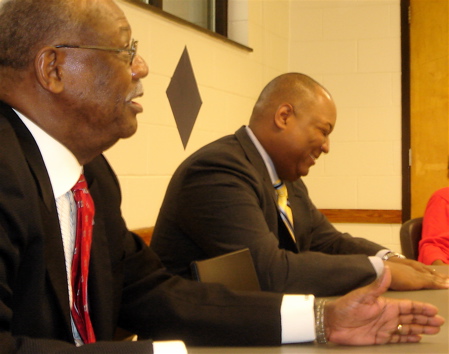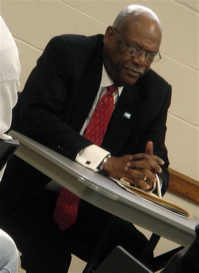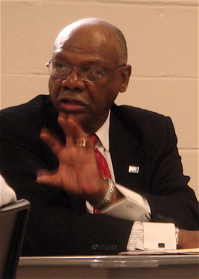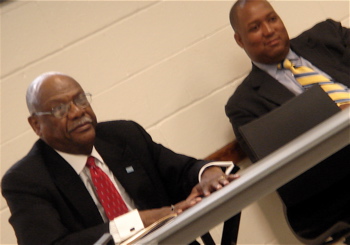
Breakfast
Forum
Charlotte, NC
www.tueforumclt.org
Home ● Where We Meet ● News ● Announcements ● Events ● About Us ● Contact Us ● Search ●

May 20, 2008
Giving Back: It's a habit of the heart, easily pursued
Tuesday's Forum speaker, Ulysses G. Ford III, grew up in Charlotte. He was back in Charlotte for the 10th annual award of a scholarship to a West Charlotte High School senior who will attend a historically black college or university in the fall.
Math teacher, public administrator, corporate executive, consultant, benefactor. Many in the room just called him Uly.
Ford gave a short address and later answered to questions. Sitting next to him was his brother's son, Joel Ford, who was recently elected chairman of the Mecklenburg Democratic Party.
Uly Ford talked about his pride in his family. But even more, he talked about how every member of a community has a responsibility to give back, to nurture young people, to invest private wealth in the improvement of the community and the individuals who are a part of it.
In this space below, excerpts from what Ford said to the Forum:
 "We
tried to tell our sons, if they aren't better than we are, then we failed. What
we tried to do is push all of the Fords on to bigger and better things so that
the next generation will exceed what has been before, because that is the
tradition of the African-American community since we have been in this
country....
"We
tried to tell our sons, if they aren't better than we are, then we failed. What
we tried to do is push all of the Fords on to bigger and better things so that
the next generation will exceed what has been before, because that is the
tradition of the African-American community since we have been in this
country....
"I'm the oldest of three boys, raised in Fairview Homes, by my mother, on welfare, with little, almost no means of attending college.
"Back in those days, people in the neighborhood helped raise you, and I was very fortunate, from all corners, 'Boy, you're going to do good.' 'Boy, you're smart.' 'Boy, we're proud of you.' And would snatch me up when they saw me doing some of those crazy things we used to try to do.
"The worst thing in the world was to have somebody say, 'I'm gonna call your mother and tell her.' Because any time they did that to me, I'd walk home in the middle of Oaklawn Avenue hoping somebody would knock me over because I sure didn't want to go home and face my mama....
"But I did get to West Charlotte. And at West Charlotte there were several great teachers. I was also very fortunate that the principal of my elementary school taught my mother. The principal of my high school taught my mother. The principal of Northwest at the time was classmates with my mother. And that was true for many students in the community.
"We went to school in a totally segregated situation. But there were some neat
and powerful benefits. In addition the shortcuts, there were some powerful
benefits -- especially the attention you got, the encouragement you got, the
care and loving you got... that went away with integration....
Q: What solutions do you find for young people trying to find
their way?
A. "When we look across the country... there are many problems.
Before we move beyond that, though, let's also recognize that there is an awful
lot of positive happening also, an awful lot.
"I remember when my son graduated from Morehouse, I was there with 800 black men graduating from college and there was not a news camera around to cover that. And I'm sure a couple of weeks ago that all of the, what is it now? 43 HBCUs? So there is a lot of good going on.
"But there is a lot that needs to be done. And I don't have a crystal ball and I
don't have any magic answers. I do know this:
I am a member of 100 Black Men. And that's an organization that is doing a lot
of good.
Give kids a goal, and the means to reach it
We adopted a class of fifth-graders. We told them: Finish school, get accepted at a college, money won't be a problem. There are 44 of them. And we got the most at-risk class in the [Macon, Ga.] system -- lowest test scores, highest gang involvement, lowest parent participation, highest drug use. They told us 50% of them wouldn't finish junior high, and that 10% of them wouldn't finish high school.
 "First
of all, 27 of them finished. We've got 13 in college and universities, and if we
get a few more to pass the Georgia state tests, we think we can get five
more....
"First
of all, 27 of them finished. We've got 13 in college and universities, and if we
get a few more to pass the Georgia state tests, we think we can get five
more....
"We've also got to nurture and support those individuals who give back to the community. I know when I was growing up, and some of you many remember Hank ..., who coached. He just popped up and coached us. Malachi's daddy, Mr. Greene, coached us and was a Boy Scout leader.... There were individuals like that in this community. And we've got to nurture and help them.
"If they're going to give the time and the energy, away from their families and their other interests to get involved in our community, can't we help them financially? Can't we help them get hats and gloves, jerseys for those kids who can't afford them? Can't we do a little something, let them go on a trip? If we've got people like that in the community, let's support them.
"I'm a firm believer in public education. It was good to me. All our boys went to a public school.... I think we have to hold the public education system accountable. I think what happens is, so many of us with a voice leave the system, they've got kids somewhere else, or we find other means of getting an education, and forget the community good that comes from education and that a public education should be a right.
"I think we need to be on school boards, in schools, PTAs, PTOs, any other organizations that they've got at these schools, that says, You're going to perform because we need you to, and we're going to help you do that. What is it that you need us to be doing as a community to help you do the education? And this goes beyond sport.
The Rule of 80
 "I
was at West Charlotte, and we creamed everybody. We were just good. But my baby
boy was a start quarterback... and we had a Rule of 80 in our house: You made
below 80 for that grading period, you don't do any extracurricular activities
until you bring your grades up.
"I
was at West Charlotte, and we creamed everybody. We were just good. But my baby
boy was a start quarterback... and we had a Rule of 80 in our house: You made
below 80 for that grading period, you don't do any extracurricular activities
until you bring your grades up.
"Well, he got a 77 in some stupid course. The coach called me at work. He said, Michael turned in his equipment. What's wrong? I said I don't know, I'll have to talk to him when he gets home. He got home, I knew why Michael had turned in his equipment.
"The coach called me back when he found out and said Michael has the highest
average on the football team. That ain't the issue: If as quarterback Michael's
performance was not at 98%, he wouldn't be your star quarterback. High
performance is important to you in one respect. It's important to his mama and
daddy in another, and that's his academics....
Q: Charlotte has changed. Would you like to go back to the old
days?
A: "I don't believe it's the nature of the world, or of humans,
to just stand still or go back. I do think that you should evolve and go on to
greater fame. I do think... that we don't take enough time to reflect on what
was good from the past that maybe we can and should continue as we do move
forward.
"I know hindsight is 20-20 and better than a crystal ball, but there are some things, particularly in the African-American community, that if we could have reflected on, we could have maybe done differently.
"I don't know that this country would ever deal fairly with separate but equal. But there were some advantages with that type system in the way the country was functioning at that time. And there were some things, some currents, some institutions, that we could have taken forward. Education was just one.
"When I grew up in Charlotte, 96% of the black folk lived in the northwest quadrant of the city. That's how segregated it was. We had Brookhill and Southside and Griertown and Cherry and all that, that's where the other 4% was....
 "Now
I grew up in the projects, and I saw con artists and fast, wheeler-dealers,
bootleggers and all that. They were flashy: They had the flashy cars... and
always seemed to have a pocketful of money.
"Now
I grew up in the projects, and I saw con artists and fast, wheeler-dealers,
bootleggers and all that. They were flashy: They had the flashy cars... and
always seemed to have a pocketful of money.
"But in addition to that I saw entrepreneurs. Mr. Quick who owned a shoe shop... Mr. Romeo that owned a store, and a group of black men that owned a burial ground. I also got to see professional people -- teachers, lawyers, doctors, postmen. I got to see the everyday person who got up to go to work, then came home and took care of his family. Because we all lived right there together. We all lived there in Garden Park, where I bought our first home....
"My point being, before equal housing, we all lived in the same neighborhood, so I got to see the total range of the black community, as opposed to now, since equal housing, what we tend to do is crowd all of us in a certain economic, social level together.
"So if you grow up in that situation that's all you get to see. And sometimes that might be your defining moment, where I had an opportunity to see the whole spectrum, and could make a determination on something other than learning how to pay cards and shoot dice -- or, today, sell drugs...."
--------------------------------------------------------------------------------------------
The Forum welcomes all persons to its meetings
beginning at 8 a.m. most Tuesdays of the year
at the West Charlotte Recreation Center, 2222 Kendall Drive, Charlotte, NC
down the hill from West Charlotte High School.